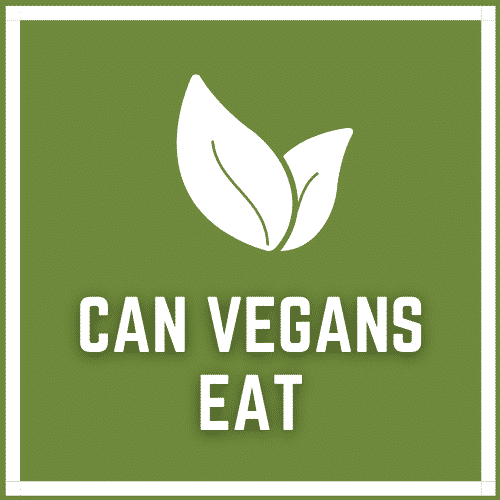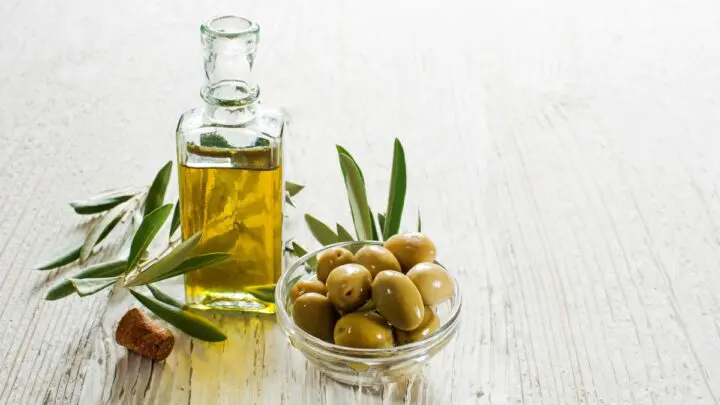Answer: Yes. Olive oil only contains liquid fat isolated from olives, the fruit of the olive trees. It also has many uses, such as in cooking, medicine, cosmetics, skincare products, and more.

The olives are pressed to extract oil through a chemical or mechanical process, which doesn’t include any animal by-products. However, while it’s considered vegan-friendly, some vegans avoid using Olive Oil due to the environmental impact of its production.
In this article, we’ll learn more about Olive Oil and why other vegans consider it harmful to the environment.
Table of Contents
What Is Olive Oil?
The olive tree, a traditional crop native to the Mediterranean Basin, bears the fruits called olives that are pressed and processed to extract oil.
Its origin dates back to as early as the 8th millennium BC during the Neolithic period when people would collect wild olives.
However, it’s unclear where or when olive trees were first cultivated, although they reached Libya and Greece in the 28th century BC. But theories suggest that the olive trees may have originated in Persia and Mesopotamia.
While Olive Oil is common in cooking, it’s also widely used in cosmetics, fuel for oil lamps, medicines, and soaps. It’s also used in some religious rituals and birth control in Aristotle’s History of Animals.
The biggest producer of Olive Oil is Spain, followed by Greece, Portugal, Tunisia, Morocco, Italy, and Turkey. But Greece has the highest consumption.
Cultivars
Olives have hundreds of different varieties, which are the basis of how Olive Oil is produced. These cultivars vary by texture, shelf life, and flavor.
During the olives’ maturity, the colors change from green to violet to black. These colors have different textures and characteristics, such as bitter, spicy, and sweet flavors.
How Is Olive Oil Extracted?
Green olives produce a bitter and spicy taste, while the ripe ones produce a sweeter taste. Extra Virgin Olive Oil is made with perfectly ripened olives.
Producers use either the traditional method, like a large millstone, or the modern one would use a large hammer, blade, or disk mill.
Whole olives are ground into a paste using any of these methods. When a millstone is used, the olives will have to stay under it for about 40 minutes.
When the grinding process is done, the paste is placed on the stacked fiber disks and then on the press to separate the liquid from the paste.
But modern grinders are faster than traditional ones. And Centrifugation is a process that’s faster and more rigorous compared to the slower separation process.
As soon as the extraction is done, the oil must undergo a filtration process to produce Olive Oil with a longer shelf life. However, there are also unfiltered products that have different tastes and a cloudy appearance, which is known as Cloudy Olive Oil.
Different Grades of Olive Oil
About 95% of Olive Oil manufacturers worldwide adhere to the regulations imposed by the International Olive Council (IOC). This includes the grading standards and the labeling to guide the consumers.
There are different classifications of Olive Oil grades that manufacturers should follow.
- Refined Olive Oil. This is a virgin oil with free acidity. It’s been refined using charcoal and other chemical filters, which don’t change its glyceridic structure.
- Virgin Olive Oil. Many consumers say this has good or better taste, although there may be a few sensory defects. It’s a lesser grade of virgin oil.
- Extra Virgin Olive Oil. This is extracted through cold mechanical extraction and the highest grade of virgin Olive Oil. It doesn’t go through a refining process, giving a superior taste with a hint of fruitiness and zero sensory issues.
- Olive Pomace Oil. It’s a refined pomace Olive Oil but is usually mixed with virgin oil. It gives a more neutral flavor and is also used in cooking. Pomace oil also offers the same health benefits as pure or virgin Olive Oil, although some connoisseurs wouldn’t consider it for cooking.
The United States, though, isn’t part of the OIC. They have their grading standards imposed by the United States Department of Agriculture (USDA). The USDA certifies these voluntary grades.
- U.S. Refined Olive Oil. It’s derived from refined oils with a few restrictions during the process.
- U.S. Olive Oil. This is a blend of refined and virgin oils.
- Mechanically Extracted U.S. Virgin Olive Oil. This doesn’t fit for consumption and has poor taste and odor.
- U.S. Virgin Olive Oil. This has good taste and odor and is great for consumption.
- U.S. Extra Virgin Olive Oil. This offers excellent or superior taste and odor and is widely used by most cooking connoisseurs.
Environmental Impact of Olive Oil Production
Even though Olive Oil doesn’t involve any animal by-products during its production, some vegans, especially those who went vegan for the environment, don’t use Olive Oil.
Many environmentalists fear that growing olive trees requires larger areas, so many plants, and other trees must be removed. This also destroys many wildlife habitats.
Some plantations also have poor soil quality, which can mean more water, pesticides, and synthetic fertilizers are needed.
This would require tons of water, especially since most plantations lack rainfall. Another issue is the removal of other plants and trees when wider areas are needed to grow olive trees.
This will cause soil erosion, especially in typically dry areas. This is called desertification, which leads to deforestation because of unfitting weed control and soil management practices.
The chemicals used in growing olive trees can also cause water pollution in rivers, lakes, and other bodies of water. In most cases, water carries these synthetic pesticides and fertilizers to the bodies of water, contaminating even the drinking water.
Additionally, Olive Oil wastewater is non-biodegradable, especially since it involves toxic chemicals to plants and other living organisms. Chemically involved wastewater can’t be treated by most water facilities because of its toxicity.
This causes heavy waste and is damaging to the environment.
Also, traditional Olive Oil productions have high labor, with some workers being underpaid. This and water pollution, as well as soil erosion and wildlife destruction, are the main issues in Olive Oil production.
On the plus side, some olive plantations and productions follow the Fairtrade International standards. This includes the prevention of soil erosion and deforestation, controlled use of chemicals, biodiversity enhancement, and many more.
Fairtrade International certifies any Olive Oil producers that follow these standards.
Olive Oil Health Benefits
Despite the growing concerns of many environmentalists about the production of Olive Oil, it’s undeniable that Olive Oil offers amazing health benefits.
Dietary fat can be controversial, but most health experts agree that Olive Oil is healthy for everyone.
But why?
- Olive Oil is packed with healthy Monounsaturated Fats (MUFAs). This is called Oleic Acid, which helps reduce the risk of inflammation and cancer.
- It’s loaded with superior antioxidants, especially Extra Virgin Olive Oil, which aids in reducing chronic diseases. These antioxidants are biologically active and do well in fighting inflammation and heart disease.
- It may help prevent or reduce the risk of strokes because of its healthy MUFAs. A large study found that people who regularly consume Olive Oil have a much lower risk of strokes as well as heart diseases.
- Olive Oil has anti-bacterial properties that fight against Helicobacter Pylori, which lives in the human stomach that causes stomach cancers and ulcers.
- Its anti-inflammatory properties are known to have helped reduce chronic inflammation that causes Alzheimer’s, cancer, type 2 diabetes, metabolic syndrome, arthritis, and obesity.
- Its antioxidants also have anti-cancer properties that reduces free radicals, which cause oxidative damage that leads to cancer.
Other Vegan-Friendly Cooking Oils
Apart from Olive Oil, there are also other vegan-friendly cooking oils to use. These also have health benefits and are used in some cosmetics.
You may consider having these too in case you run out of Olive Oil at home.
- Avocado Oil
- Sunflower Oil
- Sesame Oil
- Safflower Oil
- Peanut Oil
- Almond Oil
- Canola Oil
The Bottom Line
Olive Oil is vegan-friendly with amazing health benefits despite the dangers that its production poses to the environment. But if you buy the right kind or type of Olive Oil, you’d be able to help tone down the carbon footprint that its production leaves.
Environmentalists suggest buying Olive Oil that’s Fairtrade-certified. Otherwise, you can check the packaging for “Organic” labeling. These kinds of Olive Oil didn’t go through a rigorous process involving chemicals.
The olives used in these kinds were also grown organically, which means there were no herbicides or synthetic fertilizers used on the plantation.
Also, experts highly recommend buying Extra Virgin Olive Oil because it has the most magical health benefits. If you run out of Olive Oil, always opt for healthy ones such as Vegetable Oil, which is derived from plants.
I’ve also rounded up some healthy options in this separate article about Vegetable Oil if you wanna check it out.

